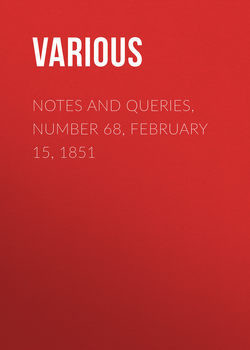Читать книгу Notes and Queries, Number 68, February 15, 1851 - Various - Страница 3
Minor Notes
ОглавлениеThe Breeches Bible.—The able and interesting article on the Breeches Bible which appeared in a late number of "Notes and Queries" (Vol. iii., p. 17.) is calculated to remove the deep-rooted popular error which affixes great pecuniary value to every edition of the Bible in which the words "made themselves breeches" are to be found, by showing that such Bibles are generally only worth about as many shillings as they are supposed to be worth pounds. It is worth noting, with reference to this translation, that in the valuable early English version, known as Wickliffe's Bible, just published by the university of Oxford, the passage in Genesis (cap. iii. v. 7.) is translated "thei soweden togidre leeues of a fige tree and maden hem brechis."
Effessa.
Origin of the present Race of English.—In Southey's Letters of Espriella (Letter xxiv., p. 274., 3rd edit.), there is a remark, that the dark hair of the English people, as compared with the Northern Germans, seems to indicate a considerable admixture of southern blood. Now, in all modern ethnological works, this fact of present complexion seems to be entirely overlooked. But it is a fact, and deserves attention. Either it is the effect of climate, in which case the moral as well as the physical man must have altered from the original stock, or it arises from there being more "ungerman" blood flowing in English veins than is acknowledged. May I hazard a few conjectures?
1. Are we not apt to underrate the number of Romanised Celts remaining in England after the Saxon Conquest? The victors would surely enslave a vast multitude, and marry many Celtic women; while those who fled at the first danger would gradually return to their old haunts. Under such circumstances, that the language should have been changed is no wonder.
2. Long before the Norman Conquest there was a great intercourse between England and France, and many settlers from the latter country came over here. This, by the way, may account for that gradual change of the Anglo-Saxon language mentioned as observable prior to the Conquest.
3. The army of the Conqueror was recruited from all parts of France, and was not simply Norman. When the men who composed it came into possession of this country, they clearly must have sent home for their wives and families; and many who took no part in the invasion no doubt came to share the spoils. Taking this into account, we shall find the Norman part of the population to have borne no small proportion to the then inhabitants of England. It is important to bear in mind the probable increase of population since 1066 A.D.
Terra Martis.
True Blue.—I find the following account of this phrase in my note-book, but I cannot at present say whence I obtained it:—
"The first assumption of the phrase 'true blue' was by the Covenanters in opposition to the scarlet badge of Charles I., and hence it was taken by the troops of Leslie in 1639. The adoption of the colour was one of those religious pedantries in which the Covenanters affected a Pharisaical observance of the scriptural letter and the usages of the Hebrews; and thus, as they named their children Habakkuk and Zerubbabel, and their chapels Zion and Ebenezer, they decorated their persons with blue ribbons because the following sumptuary precept was given in the law of Moses:—
"'Speak to the children of Israel, and tell them to make to themselves fringes on the borders of their garments, putting in them ribbons of blue.'"—Numb. xv. 38.
E. L. N.
"By Hook or by Crook."—The destruction caused by the Fire of London, A.D. 1666, during which some 13,200 houses, &c., were burnt down, in very many cases obliterated all the boundary-marks requisite to determine the extent of land, and even the very sites occupied by buildings, previously to this terrible visitation. When the rubbish was removed, and the land cleared, the disputes and entangled claims of those whose houses had been destroyed, both as to the position and extent of their property, promised not only interminable occupation to the courts of law, but made the far more serious evil of delaying the rebuilding of the city, until these disputes were settled, inevitable. Impelled by the necessity of coming to a more speedy settlement of their respective claims than could be hoped for from legal process, it was determined that the claims and interests of all persons concerned should be referred to the judgment and decision of two of the most experienced land-surveyors of that day,—men who had been thoroughly acquainted with London previously to the fire; and in order to escape from the numerous and vast evils which mere delay must occasion, that the decision of these two arbitrators should be final and binding. The surveyors appointed to determine the rights of the various claimants were Mr. Hook and Mr. Crook, who by the justice of their decisions gave general satisfaction to the interested parties, and by their speedy determination of the different claims, permitted the rebuilding of the city to proceed without the least delay. Hence arose the saying above quoted, usually applied to the extrication of persons or things from a difficulty. The above anecdote was told the other evening by an old citizen upwards of eighty, by no means of an imaginative temperament.
